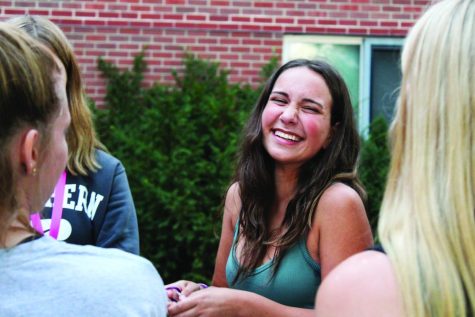Climate study results released
Climate study reveals student and faculty perceptions of inclusivity, accessibility
The UNI Climate Study, conducted in fall 2022, seeks to help understand interactions on campus, especially after the COVID-19 pandemic. 3,329 responses were collected from across campus.
This past week, the UNI Climate Study was released to the public. According to the Climate Study website, “Rankin Climate, LLC, an external consulting firm specializing in action-focused climate assessments,” was brought in by the university to assist with the project. The study was facilitated to understand how UNI could grow to be more inclusive to those on campus, students and faculty alike. There were 3,329 responses from across the university’s campus. Of these responses, 2,185 were undergraduate students, 232 were graduate students, 299 were faculty and 613 were staff members.
There was a wide range of questions asked on the survey, as documented in the Final Report from the Climate Study. Sense of belonging, academic success, seriously considering leaving the university, financial hardship and unwanted sexual contact were all surveyed and reported in the Final Report. Beyond some of the questions asked in the survey, the report also breaks down the fine details of the demographics at UNI, going beyond the racial or sexual orientation demographics. The Climate Study reported about how many students who were employed by the university responded, and what department those students worked in. The Climate Study reported about how many undergraduate students are in on-campus organizations, and what specific organizations, like Fraternity & Sorority Life, to health & wellness organizations, to campus publications. The Climate Study also collected data about how undergraduate students paid for college, broken down further into first generation students, and undergraduate student’s GPAs.
There is a wide range of data sets reported on in the Final Report from the Climate Study. But, one data set that will have the biggest impact on the university’s inclusivity is the “Comfort with the Climate” data set. This set was broken down into smaller pieces, measuring by gender identity, racial identity, sexual identity, and disability status. Of the gender identity set, between 51%-59% of participants, including men, women and transgender people, responded with “comfortable” to express how they feel on campus. Overall, respondents in the racial identity set had a steeper range. Forty-one percent of Black respondents listed “comfortable,” 67% of Latinx respondents listed “comfortable” 56% of Additional Respondents of Color listed “comfortable,” 57% of White respondents listed “comfortable” and 51% of Multiracial respondents listed “comfortable.” With these data sets, UNI will be able to understand further how to promote inclusivity on campus.
Another measurement taken by the Climate Study is just how accessible UNI is for everyone on its campus. This section of the Climate Study reported on the barriers for students with disabilities at UNI. According to the study, “11% of respondents experienced barriers related to textbooks and 8% in relation to food menus…13% of respondents experienced barriers related to accommodations from faculty.” One of the emerging themes from the study analysis in relation to accessibility was “issues getting accommodations,” where “respondents who identified as having disabilities/conditions also shared that they had issues getting accommodations at the institution.” In this analysis, two undergraduate students were quoted, one reporting, “The accessibility office offers nothing but lip service to students with disabilities. The professors offer no real help as well considering they have so many students to teach.” The second undergraduate student reported, “It was very difficult for me to get the appropriate accommodations needed for my medical condition. I was not treated with respect by the accommodations department.”

There were even sharper disparities in barriers between transgender respondents and inclusivity at UNI. Out of the transgender respondents, 41.7% reported that there were restroom barriers for transgender students at UNI, alongside an overwhelming theme of students wanting to see more gender neutral bathrooms on campus, as discussed on page 80 of the report. Another barrier theme documented by the Climate Study was issues with deadnaming on UNI ID Cards, where undergraduate students reported at the time of the survey that their UNI ID requires them to have their birth name on their ID. The ability to use preferred names on UNI IDs was just implemented in January 2023. One undergraduate student commented, “The fact that my employer has access to my dead name because I am not in a position to legally change it yet is incredibly jarring and disturbing.” On top of barriers with bathroom and ID accommodations, transgender survey respondents also responded in starkly higher numbers than their cisgender peers in “Personal experiences of exclusionary, intimidating, offensive and/or hostile conduct as a result of their gender identity.” Overall, 33% of transgender respondents reported that they experienced this conduct in some way, and 77% of transgender respondents accredited the conduct to their gender identity.
The Climate Study that was recently released includes information about diverse subjects that affect everyone on UNI’s campus. This data provided by the study will give the university more knowledge when it comes to what students, faculty and staff alike need to see when it comes to inclusivity and accommodations here at UNI. There is over 400 pages of data in the Final Report, and students have access to this report via the UNI Climate Study website. Students can login with their CatID to see the full report.











